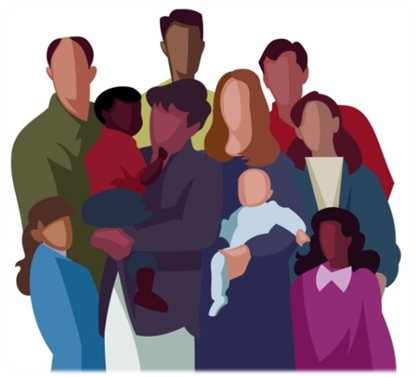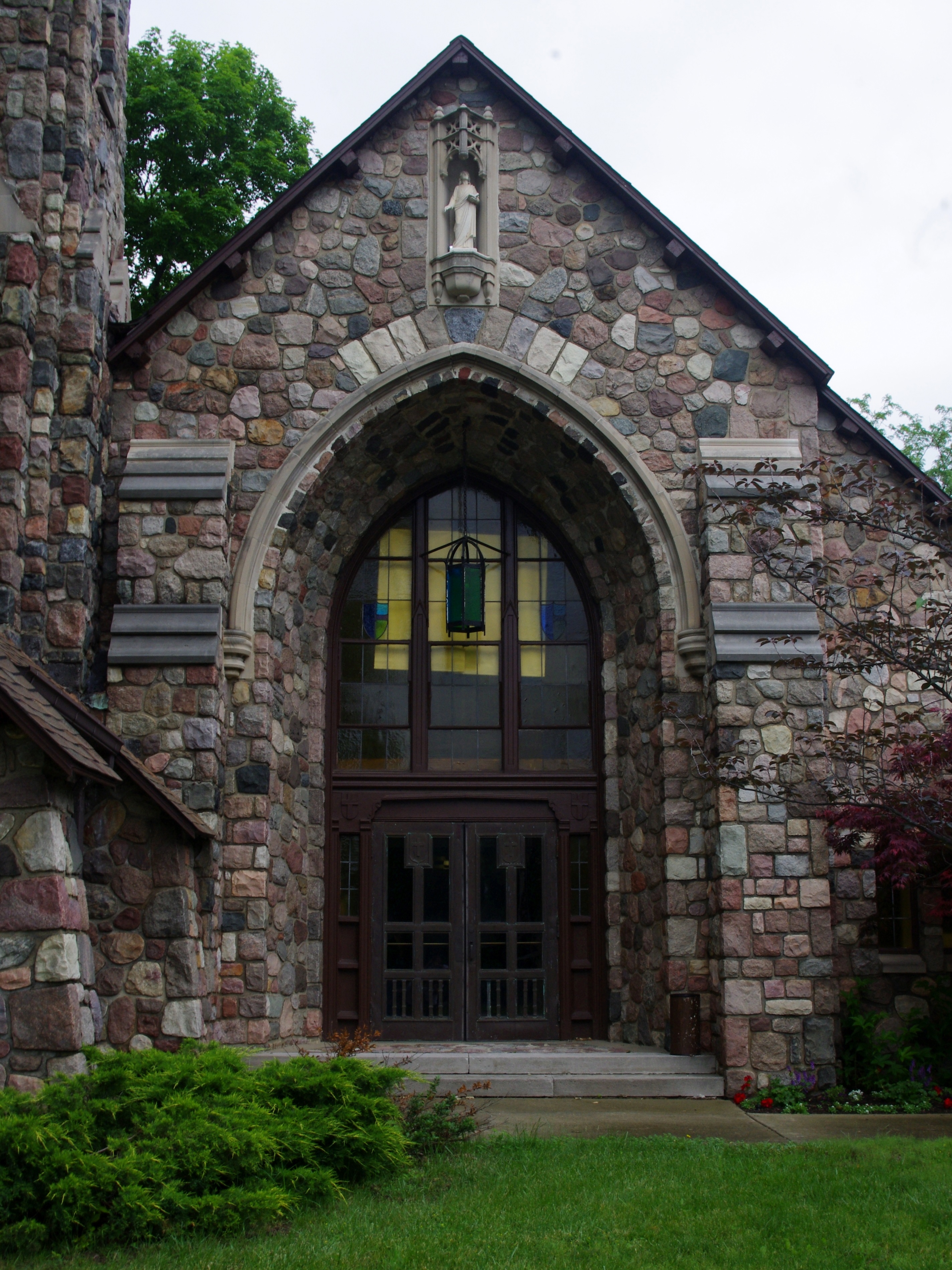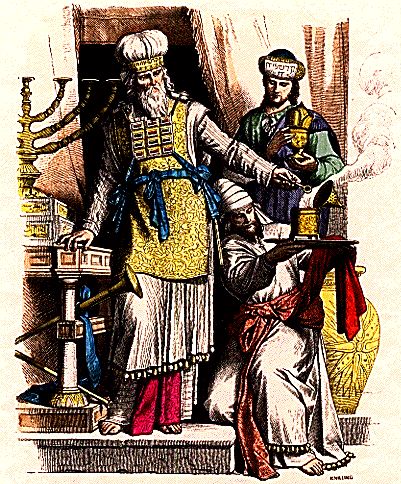Sermon for May 14, 2017 (fifth Sunday of Easter)
Scripture readings:
Acts 7:55-60; Psalm 31:1-5, 15-16; 1 Pet. 2:2-10; John 14:1-14
SHARING IN GOD’S COMMUNITY (1 Peter 1:22-2:10)
(a sermon about church unity and participation)
By Ted Johnston
Introduction
The Christians to whom Peter wrote were facing the likelihood of increased persecution from the Romans. Knowing this, Peter urged them to “hang in”—to hold on to the true source of their unity, namely their sharing together in God’s divine nature.
From all eternity, God—Father, Son and Spirit—is a tri-personal (triune) communion of love. In Jesus, who is the union of God and humankind in one person, all humanity has been reconciled to God—accepted by God, forgiven, granted relationship with the Father, in the Son, by the Spirit. And now the Spirit calls people to live into that relationship as members of the church, which is called to proclaim that reconciliation to the world.
In order to exhort Christians facing difficulties to remain united in this identity and calling, Peter offers four vivid pictures of the church brought together as 1) God’s family, 2) God’s building, 3) God’s temple and 4) God’s nation. Let’s hear and respond to this exhortation to share actively and together in God’s community on earth.
1. We are members of the same family (1:22–2:3)

Peter first notes that our unity as the church is grounded in the truth that we are part of God’s family, knit together by one love, one birth, and one source of nourishment:
a. One love
Now that you have purified yourselves by obeying the truth so that you have sincere love for your brothers, love one another deeply, from the heart. (1 Peter 1:22)
“Obeying the truth” refers to our participation in the reconciliation with God that humanity has in Christ (see 1 Peter 1:18)—a participation that involves sharing Jesus’ love—here described using two Greek words: philadelphia (brotherly love) and agape, (sacrificial love). In our union with Jesus, we share in his love for all humanity, including one another. This love, shed abroad in our hearts by the Holy Spirit (Rom. 5:5), is the visible evidence that we are indeed God’s “obedient children” (1 John 4:7–21; 1 Pet. 1:14).
Our love is “sincere” because it is “from the heart”—our sharing in Jesus’ heart for others. It’s a love that is never self-serving. Moreover, it is fervent—we “love one another deeply” (literally, “with all our energy”). We show this love to others as we treat them the way God treats us: God forgives us, so we forgive them; God is kind to us, so we are kind to them. This love is not a mere feeling, but a matter of a will formed in and flowing from Christ himself. We are one family grounded in and expressive of Jesus’ own love.
b. One birth
For you have been born again, not of perishable seed, but of imperishable, through the living and enduring word of God. For, “All men are like grass, and all their glory is like the flowers of the field; the grass withers and the flowers fall, but the word of the Lord stands forever.” And this is the word that was preached to you. (1 Peter 1:23-25)
We are one family through the rebirth of humanity accomplished in Jesus 2,000 years ago. Now, one person at a time, the call to participate in that family relationship goes out through “the word that was preached” (the gospel). Through the ministry of the Spirit, people are awakened to the gift that is already theirs in Jesus through repentance (changing their understanding about their identity), and faith (trusting in Jesus).
This radical change in perspective engenders a “new and living hope” (1 Pet. 1:3) and an active sharing in the “divine nature” (2 Pet. 1:4). Through this participation, a person becomes part of a family of believers bonded together by a force stronger than any other—stronger even than death, and surely stronger than any persecution or other external force.
c. One source of nourishment
Therefore, rid yourselves of all malice and all deceit, hypocrisy, envy, and slander of every kind. Like newborn babies, crave pure spiritual milk, so that by it you may grow up in your salvation, now that you have tasted that the Lord is good. (1 Peter 2:1-3)
God’s family, the church, is united as it is nourished together by “pure spiritual milk”—God’s word, which comes to us in Scripture, through the Spirit, and the teaching of the church. This word, which is Jesus and his gospel, has life and gives life. Our responsibility as Christians is to cultivate an appetite for what is called here “pure spiritual milk” and elsewhere “strong meat” for the mature (1 Cor. 3:1–4; Heb. 5:11–14), “bread” (Matt. 4:4), and “sweet honey” (Psalm 119:103). This word is indeed very good; and it is vital! Let us ingest it and then share it!
As we are nourished in the word, we will “rid” ourselves of and “lay aside” wrong attitudes of heart that undermine the unity of the church. Such harmful attitudes include malice, a reference to wickedness in general, and deceit, a reference to devious words and actions to get our own way. Such attitudes tend toward hypocrisy as we try to cover them up and often cause division in the church as an expression of envy that can result in slander—conversation that tears others down.
If these attitudes and actions are in our lives, we lose an appetite for God’s word. If we stop feeding on his word, we stop growing, and we stop enjoying (tasting) the grace that we find in Jesus. But when we are being nourished by the word, we grow as peacemakers who promote the unity of the church.
2. We are stones in the same building

As you come to him, the living Stone—rejected by men but chosen by God and precious to him—you also, like living stones, are being built into a spiritual house to be a holy priesthood, offering spiritual sacrifices acceptable to God through Jesus Christ. For in Scripture it says: “See, I lay a stone in Zion, a chosen and precious cornerstone, and the one who trusts in him will never be put to shame.” Now to you who believe, this stone is precious. But to those who do not believe, “The stone the builders rejected has become the capstone,” and, “A stone that causes men to stumble and a rock that makes them fall.” They stumble because they disobey the message–which is also what they were destined for. (1 Peter 2:4-8)
Here Peter notes that there is only one foundation of the church—the one “living stone” or “cornerstone”—Jesus. He builds us into one spiritual building, namely the church. Whether we agree with each other or not, whether we get along or not, the truth is that in Jesus, we belong to each other as “living stones” that he uses to build up God’s building.
Jesus is the ultimate living stone because, in him, all humanity is raised from the dead and ascended with him in victory. He is also the chosen, supremely precious stone of the Father. Peter here quotes Isaiah 28:16 and Psalm 118:22, noting that Jesus, though chosen by God, was rejected by humans. He was not the Messiah they were expecting, so they stumbled and fell over him. Jesus referred to this same Scripture when he debated Jewish leaders (Matt. 21:42ff; and see Psalm 118:22). People today still stumble over Jesus and his gospel (1 Cor. 1:18ff), but those who respond in trust and belief “will never be put to shame.”
Jesus compared his church to a building: “I will build my church” he said (Matt. 16:18). His disciples are living stones in that building, no matter where they reside (and remember that Peter was writing to Christians scattered across Asia Minor). Each time a person repents, believes and takes up their cross to follow Jesus as his disciple, the Spirit places them as a living stone into this building, the church. They are gifted and cemented there by grace.
It sometimes looks to us that the church on earth is a pile of rubble and ruins, but God sees the total structure as it grows (Eph. 2:19–22) and he sees ONE structure, one building, though it has many local expressions. What a privilege it is to be a part of this one church! Let’s strive to express the unity it has been given as God’s building built on the one cornerstone of Jesus Christ.
3. We are priests in the same temple

You also, like living stones, are being built into a spiritual house to be a holy priesthood, offering spiritual sacrifices acceptable to God through Jesus Christ…. You are a chosen people, a royal priesthood, a holy nation, a people belonging to God, that you may declare the praises of him who called you out of darkness into his wonderful light. (1 Peter 2:5, 9)
Next Peter notes that all in this building are part of a “holy” and “royal priesthood.” Why? Because we are all included in Christ, the one High Priest of God (Hebrews 7). In the Old Testament period, God’s people had a priesthood; but today, God’s people are a priesthood. United to Christ, each believer is seated with Christ in God’s presence (Heb. 10:19–25; 1 Tim. 2:1–8), with the privilege of joining with their Lord in his ministry of intercession. As co-ministers with Jesus, Christians are called and gifted to work together in his service. This service as priests is a fundamental part of what constitutes our unity-in-diversity within the church.
As priests with Jesus, we do not bring animal sacrifices as did Old Testament priests. Rather, we bring “spiritual sacrifices.” These include our bodies (Rom. 12:1–2), the praise of our lips (Heb. 13:15) and good works done in service to others (Heb. 13:16). We also present our money and other material goods (Phil. 4:10–20). And we also bring the people who turn to God as a result of our ministry (Rom. 15:16). What a privilege!
The fact that each of us is invited by God to offer spiritual sacrifices to him should not be taken as encouragement to selfish “individualism.” We are priests not separately, but together, serving together with the one High Priest, ministering in the one spiritual temple.
4. We are citizens of the same nation

You are a chosen people, a royal priesthood, a holy nation, a people belonging to God, that you may declare the praises of him who called you out of darkness into his wonderful light. Once you were not a people, but now you are the people of God; once you had not received mercy, but now you have received mercy. (1 Peter 2:9-10)
Peter’s description of the church here parallels the description of Israel in Exodus 19:5–6 and Deuteronomy 7:6. In contrast to the disobedient and rebellious nation of Israel, God’s people today are his chosen and holy nation. The church formed by the new covenant is now in the world what Israel was meant to be—God’s representative to declare to the whole world who God is and what he has done. The church has this role in three ways:
First, the church is a people belonging to God. This speaks to the grace of God in Jesus. God did not choose Israel because they were a great people, but because he loved them (Deut. 7:7–8). Now God’s choosing has broadened to all humanity in the person of Jesus, the God-man, purely on the basis of God’s love and grace. This election of all humanity in Jesus is being played out in the church, Jesus’ chosen instrument to proclaim this grace to the world: “You did not choose me, but I chose you” (John 15:16).
Second, the church is a holy nation. It is set apart to participate actively in God’s holiness—his triune love and life. Our citizenship is with God in this divine relationship—this is where we have our allegiance (Phil. 3:20) and our true home. Israel forgot what God had made the nation and had called it to be, and so lost its place as the representative of God on earth to all humanity. Now this role belongs to the church—God’s nation sent to the whole world with the message of God’s grace in Jesus.
Third, the church is the people of God. The human race, because of sin, was cut off from God, but now in the person of Jesus, all humanity has been brought back (reconciled) to God. The church, God’s representative nation on earth, is sent to tell the world the good news of the home they now have with God.
With each of these three aspects of the church’s identity comes the responsibility to declare to all people the good news of what Jesus has done. We are to “declare the praises” (or “the mighty acts” NRSV) of God—his amazing grace extended to a world he already has reconciled to himself in his Son, yet one that continues to walk in substantial darkness because of ignorance of that reconciliation. We are called as God’s ambassadors to make known this grace, this “marvelous light” in Jesus. Our lives should radiate that light, and our mouths proclaim it, as together, we are a light “set on a hill” for all to see, a clarion call for all to hear.
Conclusion
As God’s family, building, temple and nation, we are one in Christ—he is our source of unity. This unity does not eliminate our God-given diversity. Not all children in the family of God are alike, nor are all the stones in his building identical. In fact, it is diversity that gives beauty and richness to the family and the building. Christians can and do differ, yet all who cherish the “one faith” of the church and who seek to honor the “one Lord” can love each other and walk together (Eph. 4:1–6) despite differences. God may call us into different ministries, or to use different methods, but we can still love each other and seek to present a united witness of God’s grace in Jesus to the world.
We face many challenges that threaten our God-ordained unity. Enemies of the grace of God abound, and chief among them is Satan. He seeks to silence our demonstration and proclamation of the gospel by seeking to persecute or otherwise nullify the church’s unity and thus its effectiveness. Let’s not fall prey to his tactics. Let us be the one church our Lord and Savior Jesus Christ has made us to be.



Please note that comments are moderated. Your comment will not appear until it is reviewed.